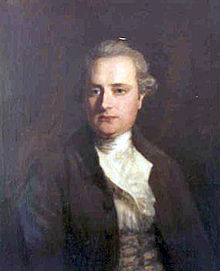Evan Nepean
Evan Nepean | |
|---|---|
 | |
| Governor of Bombay | |
| In office 1812–1819 | |
| Preceded by | George Brown |
| Succeeded by | Mountstuart Elphinstone |
| Personal details | |
| Born | 9 July 1752 St Stephens by Saltash, Cornwall, England |
| Died | 2 October 1822 (aged 70) Loders, Dorset, England |
| Spouse | Margaret Skinner |
| Children | 8 |
| Parent | Nicholas Nepean |
| Occupation |
|
Sir Evan Nepean, 1st Baronet, PC FRS (9 July 1752 – 2 October 1822)[1] was a British politician and colonial administrator. He was the first of the Nepean Baronets.
Family
Nepean was born at St. Stephens near Saltash, Cornwall, the second of three sons of Nicholas Nepean, an innkeeper, and his second wife, Margaret Jones. His father was Cornish and his mother was from South Wales.[1] The name "Nepean" is thought to come from the village of Nanpean ("the head of the valley"), in Cornwall.
Nepean married Margaret Skinner, the only daughter of Capt. William Skinner, on 6 June 1782 at the Garrison Church at Greenwich. They had eight children,[1] including Sir Molyneux Hyde Nepean, 2nd Bt., and Maj.-Gen. William Nepean, whose daughter Anna Maria Nepean married General Sir William Parke. Their youngest child, Rev. Canon Evan Nepean, became the Canon of Westminster and a Chaplain in Ordinary to Queen Victoria. His grandson Charles was a Middlesex county cricketer who also played football.[2]
Career
Nepean entered the Royal Navy on 28 December 1773, serving on HMS Boyne as a clerk to Capt. Hartwell. He was promoted to purser in 1775. During the American Revolutionary War he served as secretary to Admiral Molyneux Shuldham, in Boston in 1776 and again at Plymouth (1777–78). From 1780 to 1782 he was Purser on HMS Foudroyant for Captain John Jervis (later Lord St. Vincent).[1]
On 3 March 1782 (aged 29) he was appointed Permanent Under-Secretary of State for the Home Department. In this position, he came to have responsibility for naval and political intelligence which led to him running a network of spies across Europe. [3][4][5] This, in effect, made him Britain's top civilian intelligence official, before the establishment of a formal intelligence service, which did not take place until 1909 with the establishment of the domestically-focused Security Service (MI5) and the foreign-focused Secret Intelligence Service (SIS).[6] He served there until December 1791, when he became Under-Secretary of State for War in 1794, Secretary to the Board of Admiralty 1795–1804, Chief Secretary for Ireland 1804–1805, Commissioner of the Admiralty, and then Governor of Bombay 1812–1819.
He was Member of Parliament for Queenborough from 1796 till 1802,[7] then moving to Bridport where he remained until 1812. The Bridport Town Hall, designed by architect William Tyler RA, was given a clock tower with cupola, in about 1805, by Sir Evan.[8][9] He was made a baronet in 1802 and was admitted to the Privy Council of the United Kingdom in 1804.[1]
In 1820 he was made a member of the Royal Society. In 1822 he was appointed Sheriff of Dorset but died in office the same year at his estate at Loders.[1][10]
Legacy
Places named after Evan Nepean include:
- Australia - the Nepean River in New South Wales, the Nepean Highway and Point Nepean both in Victoria, Nepean Bay in South Australia and Nepean Island in the external territory of Norfolk Island.
- Canada - the former city of Nepean, Ontario,[11] Nepean Point, Nepean Bay.[12]
- India - the Nepean Road and Nepean Sea Road in Mumbai.
Arms

|
|
References
Notes
- ^ a b c d e f Sparrow (n.d.)
- ^ "The Association Challenge Cup". The Times. No. 27951. London. 16 March 1874. col E, p. 5.
- ^ Knight 2013, p. 6-13.
- ^ Victoria Syrett "Spies: The Georgian Secret Intelligence Service" Royal Museums, Greenwich, (11 Apr 2023) https://www.rmg.co.uk/stories/blog/library-archive/spies-georgian-secret-intelligence-service
- ^ https://Victoria Syrett, "Secret Intelligent Service: The Spies Before James Bond" Royal Museums, Greenwich, (21 Jan 2020) www.rmg.co.uk/stories/blog/library-archive/secret-intelligent-service-spies-james-bond
- ^ Christopher Andrew, Defend the Realm: The Authorized History of MI5 (New York: Vintage, 2010) 1-3
- ^ "Sir Evan Nepean" https://www.britishmuseum.org/collection/term/BIOG202986
- ^ "The baronet who gave Bridport one of its most famous landmarks – The Bridge". 8 May 2023.
- ^ Historic England. "Town Hall (450130)". Research records (formerly PastScape). Retrieved 5 October 2015.
- ^ "Nepean, Evan (1752–1822)". Australian Dictionary of Biography. National Centre of Biography, Australian National University.
- ^ "Courageous settlers first located in Carleton back in 1818". Ottawa Citizen. 28 April 1953. pp. A20. Retrieved 2 December 2015.
- ^ "Nepean...Who's Nepean?". Ottawa Citizen. 17 August 1967. Retrieved 4 July 2021.
- ^ Debrett's Peerage, Baronetage, Knightage and Companionage. 1896.
Sources
- Knight, Roger (2013). Britain Against Napoleon: The Organization of Victory 1793-1815. London: Allen Lane. ISBN 978-1-846-14177-5.
- Sparrow, Elizabeth. Nepean, Sir Evan. Retrieved 14 March 2014.
{cite book}:|work=ignored (help)